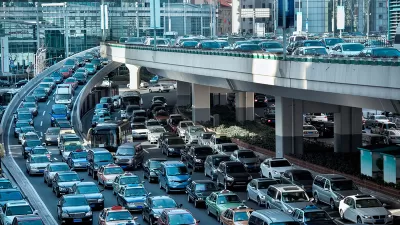According to "boundary theory," a daily commute gives us time to do the emotional work of switching roles and establishing a separation between work and home life.

After a year of working from home, writes Jerry Unseem in The Atlantic, "[m]any people liberated from the commute have experienced a void they can’t quite name." Without the daily trip to and from work, "[t]here are no beginnings or endings. The hero’s journey never happens. The threshold goes uncrossed." Useem questions what role the commute plays beyond getting people to and from work.
"In 1994, an Italian physicist named Cesare Marchetti noted that throughout history, humans have shown a willingness to spend roughly 60 minutes a day in transit," a constant that has held true, for the working class as well as the wealthiest industrialists. Today, the average American one-way commute clocks in at 27 minutes.
Participants in a UC Davis study gave a number of reasons for wanting a short–but not non-existent–commute: "the feeling of control in one’s own car; the time to plan, to decompress, to make calls, to listen to audiobooks." According to Gail Sheehy and a body of research known as boundary theory, "[y]ou get a very strong feeling of two lives with the train a bridge." The commute "is actually a relatively efficient way of simultaneously facilitating a physical and psychological shift between roles."
Useem recommends a set of habits that can help us set boundaries when working from home. Clothing, he writes, can make a big difference in your focus. "In office attire, you can’t take out the trash or water the lawn without a strong feeling that you ought to be doing something else. Like your job." He cites other examples from corporate-ritual designer Ezra Bookman, such as "lighting variations, warm-up stretches, cellphone-free walks, and, as he demonstrated to me over Zoom, shrouding your computer in a fine blue cloth when you log off, as if it, too, needs a good night’s sleep."
Ultimately, Useem says, creating new rituals can help you "replicate what the commute did for you"–the benefits we didn't appreciate until they were gone.
FULL STORY: The Psychological Benefits of Commuting to Work

Trump Administration Could Effectively End Housing Voucher Program
Federal officials are eyeing major cuts to the Section 8 program that helps millions of low-income households pay rent.

Planetizen Federal Action Tracker
A weekly monitor of how Trump’s orders and actions are impacting planners and planning in America.

Canada vs. Kamala: Whose Liberal Housing Platform Comes Out on Top?
As Canada votes for a new Prime Minister, what can America learn from the leading liberal candidate of its neighbor to the north?

Washington State’s Parking Reform Law Could Unlock ‘Countless’ Acres for New Housing
A law that limits how much parking cities can require for residential amd commercial developments could lead to a construction boom.

Wildlife Rebounds After the Eaton Fire
Following the devastation of the Eaton Fire, the return of wildlife and the regrowth of native plants are offering powerful signs of resilience and renewal.

LA to Replace Inglewood Light Rail Project With Bus Shuttles
LA Metro says the change is in response to community engagement and that the new design will be ready before the 2028 Olympic Games.
Urban Design for Planners 1: Software Tools
This six-course series explores essential urban design concepts using open source software and equips planners with the tools they need to participate fully in the urban design process.
Planning for Universal Design
Learn the tools for implementing Universal Design in planning regulations.
Central Transportation Planning Staff/Boston Region MPO
Heyer Gruel & Associates PA
Institute for Housing and Urban Development Studies (IHS)
City of Grandview
Harvard GSD Executive Education
Regional Transportation Commission of Southern Nevada
Toledo-Lucas County Plan Commissions





























